Fatal Friends, Deadly Neighbors Read online
Page 16
The investigation was embryonic at this state. Palmer and Norton hadn’t even been inside the house yet—and they said quite honestly that they didn’t know what had happened.
“I need a change of clothes,” Jonah said. “Can I go in and get some?”
“In a few hours.”
Shacknai asked the detectives to be very sensitive when they spoke with Becky’s family. “They’re very religious.”
“How is your son doing?” Palmer asked.
“He’s very critical,” Jonah sighed. “Very, very critical condition.”
Jonah Shacknai hadn’t said anything that would indicate he was at all estranged from the dead woman. Indeed, he spoke very tenderly about her. But he also seemed anxious that there might be someone in the shadows, someone who could be hazardous to him and his children. Given the hellacious losses he had had to deal with for two days, that was understandable.
* * *
San Diego County deputy sheriff Dan Pearce was assigned to the San Diego County District Attorney’s High Tech Crimes Task Force (known as CATCH). He is a Certified Forensic Computer Examiner (CFCE) and has achieved the Master Level of Computer Forensic Science Certification. In layman’s terms, Pearce has the knowledge to trace what has happened inside computers, on the Internet, and cellular phones. Highly trained technicians such as Pearce can use Cellebrite’s Universal Forensic Extraction Device (UFED) to extract data from approximately 95 percent of the smartphones, PDA devices, and cell phones in use today. Information can be extracted without changing the original data on the source phones.
Becky’s cell phone showed that a call had come in at 11:48 P.M., and that was probably Jonah’s last call to her. If there had been a text or voice mail message from him, it was no longer there. It could have been accidentally—or deliberately—erased.
Joe Friday of Dragnet never heard of computers, cell phones, smartphones and all the other devices available in the twenty-first century, and most criminals don’t realize what trails they now can leave behind.
On July 13, Deputy Pearce examined a Hewlett-Packard laptop computer, whose only active user account was Rebecca Zahau, and an iMac computer whose single user account was Jonah Shacknai. Both of the computers were from the guest room/computer room with the balcony where Becky Zahau had allegedly hung herself. He also had her Samsung cell phone.
Pearce reached three conclusions:
1. A review of the Internet history showed no searches were conducted for the terms: suicide, rope, knots, or hanging.
2. A review of the Internet history from Becky’s computer during the last twenty-four hours showed numerous searches and viewing of pornography, including lesbian and anime pornography. [The latter is a Japanese style of animated cartoon, often with violent or sexually explicit content.]
3. There were no documents found related to suicide.
What were the investigators to make of the Internet links that someone had connected to in the hours during which Becky Zahau died? Would she have searched for pornography? In her grief over Maxie, concern for Jonah, and the chaos they were all living in, why would she seek out such X-rated links on the computer? The only other person on the estate that night was Adam Shacknai.
Adam had already told detectives that he’d watched porn on his cell phone early on the morning of July 13—before he left the guesthouse and discovered Becky hanging from the balcony. He said he’d never been in the mansion itself the night before; he’d gone directly to the guesthouse where his room was. The computers were in the main house.
It was confusing. Was it perhaps possible that someone had killed Becky and deliberately roamed on the computers to make it look as though she had been watching erotic sites?
It seemed unlikely.
Among the items seized on the Shacknai estate was a Japanese video titled The Housemaid. Its scenario was chillingly similar to aspects of the life Becky lived—a beautiful maid who was in love with her wealthy employer, who adored his child. It was an erotic love story.
* * *
Quite possibly, Jonah wasn’t as close to his brother, Adam, as he was to his longtime best friend, Dr. Howard Luber. Luber was like another brother to him, a man with whom he shared his deepest feelings. The two men had known each other for sixteen years. After they met at a dermatology seminar in Hawaii, they had become best friends. They usually spoke every day.
When the investigators asked Dr. Luber about Jonah’s relationship with Becky, the dermatologist said they had been together for just under two years.
“They have—had—a special relationship,” he told detectives. “Jonah found a great deal of happiness with Rebecca—much more than he did in either of his marriages. They were very compatible and she brought tranquility into his life. Before that, his marriage to Dina could be chaotic. But Jonah and Becky were both involved in nutrition and exercise.
“Some people frowned on the difference in their ages—he was more than fifteen years older than Rebecca—but he ignored that. He loved her.”
Jonah Shacknai was a PhD and Howard Luber was a medical doctor, and they had both lived in New York when they first became friends. Eventually, they and their wives moved to the Phoenix-Scottsdale area and they often double-dated or shared family activities. At that time, Jonah was married to his first wife, Kim. The men’s wives were also good friends.
Jonah had started his business in 1988, and he was wildly successful in the pharmaceutical and beauty products field. Eventually his corporation, Medicis, was responsible for putting “Restylane” on the market. The substance was quickly in demand for plumping up and erasing wrinkles and restoring a youthful look. Actresses, models, and everyday women swear by it. And so do a lot of men, but they’re not as vocal about the treatment that takes years off their appearance.
Other companies rushed to imitate Restylane. And there were other pharmaceutical products that Jonah Shacknai spearheaded, all of them successful.
Luber had known Jonah through both of his marriages and now understood his contentment with Becky Zahau. With her gone forever, he knew his friend would be hit hard. Especially now that he faced losing Max, too.
Dr. Luber acknowledged that Jonah’s brother, Adam, hadn’t known Becky very well. He lived and worked thousands of miles away from Arizona and California. The life of a tugboat captain was a world away from Jonah’s lavish lifestyle.
And on his current trip west, Adam surely had had virtually no chance to get to know Becky better. He had been in Coronado only a dozen hours before he said he’d discovered her naked body, hanging.
Chapter Six
The Coronado Police Department and San Diego County investigators had, of course, two incidents to investigate further. Maxie’s tragic fall and Becky’s death were inextricably connected even if only by the timing. If the manner of Becky’s death and Maxie’s fall had any correlation was yet to be seen.
As far as anyone knew for sure, there were only three people in the mansion when Max Shacknai went over the second-story railing: Max, Becky, and her sister Zaré. Becky had been in one bathroom washing her hair, and Zaré was taking a bath in another bathroom. Max wasn’t a toddler, and it wasn’t unusual for him to be out of sight and earshot for fifteen or twenty minutes. There were corners and dead spots in the huge mansion where sound didn’t carry well.
But Max’s accident was loud enough to wake the dead, an eerie expression in this case. Becky and Zaré were horrified when they heard the loud crash of the chandelier that hung over the circular front entry. While Becky rushed to kneel beside the little boy and do what she could to help him, she shouted to Zaré to call 911.
Zaré was so upset that the operator misunderstood her. A tape of her call shows that the 911 dispatcher thought Zaré was calling about her mother who had fallen down and injured herself. Zaré’s voice was so full of sobs that it was hard to figure out what had happened. Frustrated, Zaré finally just gave up trying to explain; all that mattered was that the operator said that paramedics
had been dispatched and were on their way.
Nobody knew why Max had gone over the rail. He was a very active little boy and he had a Razor scooter that he zipped wildly on through the halls of the huge home. It was beside him on the floor of the entryway, along with a soccer ball and a deep red stain of blood.
Of course, Rebecca Zahau was horrified to find him barely conscious under the chandelier. So was Zaré. Becky loved Max and photos of them together certainly validated that.
Some people believed that Max had Asperger’s syndrome, a much milder form of autism. Recently, experts in child behavior have said that Asperger’s has become a convenient catchall diagnosis for very active children. If, indeed, Maxie had Asperger’s symptoms they were slight.
And anyone who has parented little boys knows how lively they can be, seemingly indefatigable.
Maxie Shacknai was bright and full of joy, a charismatic, elfin child who loved to play sports—especially when his father was there to watch him make soccer goals. Now he was silent in the intensive care unit. After his fall, he had gasped only one word out; it sounded like “Ocean,” his dog’s name.
Monday had been a blur for all of them, with Jonah at the hospital with Max, and Rebecca staying home and taking care of whatever needed to be done there. She felt that Maxie’s birth mother, Dina, should be there with Jonah, watching over their son. As much as she longed to be at the hospital, Becky stayed away.
She knew that Zaré was distressed and disappointed, but the only reasonable thing to do was to send her little sister home. The aftermath of Max’s fall and the desperate wait for some word about him had destroyed all possibility of Zaré having the fun vacation she had looked forward to. Hopefully, Max would recover and Zaré could come to Coronado or Arizona another time.
So Zaré was scheduled to fly home late on the afternoon of July 12. Rebecca’s sister Mary would meet her plane.
Another time, Rebecca promised Zaré. She had even managed to hide her own desperate concern about Jonah’s son, stretching the truth as she assured Zaré in text messages that Maxie seemed to be doing better, that he wasn’t in as deep a coma as he had been.
Rebecca kept texting Zaré until just before the teenager’s plane took off.
7/12/2011, 4:08 P.M.: “Bye miss Zaré, I love u very much let me know when y r on the plane ok . . . remember u r gate 4.”
4:14 P.M..: “Do I just wait here until my flight?”
4:37 P.M..: “Ugh!!! I have to wait an hour!!! A whole full hour!!!”
It was 8:39 P.M. when Rebecca could call Zaré back, and she learned Zaré was waiting in another city for her connecting flight. “So sorry, my dear. Please call Mary when u land ok I miss u so much already and I am so very sorry that u had to leave. Max is doing much better now but please keep praying . . . ok love u very much.”
“Yeah . . . don’t be sorry. Just make sure that u and Jonah get at least a little bit of sleep.”
That was the last communication between Rebecca and Zaré. Rebecca’s family knew by noon the next day that their beloved daughter, sister, and aunt Becky was dead.
At 3:17 the next afternoon, thirteen-year-old Zaré wrote a text message, even though she knew that Rebecca would never read it. She knew her beloved big sister was dead, but she was pretending it was all a bad nightmare.
“becky I don’t believe it com back!!!!! Im not gonna live without u!!!! I love u becky. Come back nothing is your fault.”
What did Zaré mean by that? Probably she knew that Becky would be feeling guilty because she had taken her eyes off Maxie long enough for him to fall.
* * *
Although Rebecca Zahau and Jonah Shacknai might have seemed a mismatched couple in terms of age and ethnic background, they were probably happier together than most couples experts would assume. Jonah was brilliant, an entrepreneur who had maintained his huge success for many years. Rebecca was also extremely intelligent, and her surgical assistant training let her understand the intricacies of Medicis, Jonah’s corporation.
None of Jonah’s and Rebecca’s differences concerned them. They were attracted to each other from the beginning when they met in 2009 in Scottsdale, Arizona, at the offices of the laser surgeon where Rebecca worked as an assistant.
Becky was married, but estranged from her first and only husband. Jonah and Dina’s marriage was nearing an end.
On September 13, 2008, Jonah Shacknai’s marriage to Dina Romano Shacknai imploded. They were living in Paradise Valley, Arizona, when Jonah went to the local police station to report that Dina and he had had an argument. He said she had become very angry and abusive with him. Jonah had an attack-trained German shepherd at the time and the dog became agitated to see his master threatened. According to Jonah, he quickly got between his dog and Dina, and that had given Jonah a chance to leave before the situation grew worse. He didn’t want to make a formal police complaint, but he did want to have the incident on record.
A short time later, Dina, too, filed a complaint. She phoned the police station to report that she had been bitten by Jonah’s dog during an argument. Asked if she needed medical help, she said that wasn’t necessary—but she, too, wanted a record of the situation on file.
Dina, however, did not let the incident go; she came into the Paradise Valley Police Department the next day, bringing with her a computer disc containing sixteen photographs of bruises on her body that she said had been caused by the dog.
While Dina Shacknai would not say that Jonah had ordered their dog to attack her, she said he was in no hurry to call the dog off. She insisted she had never tried to hurt Jonah; she had only raised her arm to get some space between them when he came at her “nose-to-nose.”
No charges of domestic violence were brought. Paradise Valley investigators did talk to a marriage counselor who Dina said would vouch for her fear that she would lose custody of her son with Jonah if she fought back. The therapist confirmed that, but he said Dina had never said Jonah was physically aggressive toward her.
They were divorced shortly thereafter and agreed to share custody of Maxie.
So when Jonah Shacknai met Rebecca Zahau Solanev, they were both essentially alone, perhaps hoping for a new relationship. Not only was Rebecca astoundingly beautiful and intelligent, but she had a cool head and was not easily upset or angered. After his two somewhat hectic marriages, Jonah Shacknai wasn’t eager to marry for a third time. But he was entranced with Becky, and comfortable in what quickly became a completely loving and noncombative relationship.
One thing the two had in common was a need for close family connections.
Chapter Seven
Even with major advances in forensic technology, some of the oldest methods in crime solving cannot be duplicated by electronic devices. Detectives call it “hitting the bricks,” or “heel-and-toeing.” Those San Diego sheriff’s investigators who weren’t on the Shacknai property gathering evidence or diagramming the crime scene set out in two-person teams to question the neighbors along Ocean Boulevard.
Most of those residents dwelling along the beach road were at least millionaires, and their homes were far grander than the ones where detectives usually knocked on doors, and showed their badges and ID.
But that was the only difference. All of the people who came to the door were both curious and frightened.
Detectives Todd Norton of San Diego County and Angel Sadanjo of the Coronado Police Department, and Special Agent Sonia Ramos of the California Department of Justice moved along the street.
Two doors northwest of the Spreckels Mansion, a middle-aged woman welcomed them and introduced her daughter, her niece, and several children, all of whom looked to be under six years old. The adults remembered the police and ambulance coming to get Max Monday morning.
“We saw him being brought out on a stretcher and then the ambulance took off,” the homeowner recalled.
“Do you know the woman who lived there?”
“We know Jonah Shacknai—he bought the mansion in 2009,
” the older woman said. “And I saw him at the sports club at the Hotel del Coronado. He was with a voluptuous, young Asian woman. That would have been the day after the Fourth of July. But I don’t really know her.”
During the forty-eight hours between Max being carried out and the second arrival of emergency vehicles, however, none of these possible witnesses had seen or heard anything worrisome.
“You might ask at the house that’s two doors on the other side of the Shacknai place,” the woman offered. “I know the couple who live there have teenagers who seem to be friends of the teenage girl who often visits at the mansion. I think she’s Jonah’s daughter. They’re likely to know a lot more than we do.”
Although all the estates along Ocean Boulevard were “next door” to each other, they weren’t nearly as close as in middle-class neighborhoods. It wouldn’t be at all unusual for neighbors to fail to hear cries for help or sounds of a struggle.
In the aftermath of double tragedies, a number of the nearby residents had gone to their balconies, roofs, or upper stories of their huge homes, or found another viewpoint from which they could see Becky Zahau’s body and the police and fire EMTs’ activity below.
Next door to the first estate, the residents were an older couple who lived on Ocean Boulevard year-round. They said that the Spreckels Mansion was very quiet and dark when they got home around 8 P.M. on Tuesday. That was probably within an hour, give or take, of when Becky and Adam Shacknai had driven home after dropping Jonah off at the Ronald McDonald House.
“There were no lights on at Jonah’s house, and I saw just one light in the guesthouse. I’m quite sure there was no body lying there then,” the woman told the investigative trio. “I saw the woman’s body at about a quarter to nine this morning—she looked like a mannequin. And I remember seeing a woman who looked similar getting out of a taxi about a month ago.”
“Have you seen people coming or going to the Shacknai estate?” Sonia Ramos asked.
The wife shook her head. “No, there weren’t many people there. The ones who visited were mostly younger—kids from about eight to sixteen. Usually, there’s a young couple who live there in an apartment over the garage—but I haven’t seen them lately. They were caretakers of the estate, I think. I know the husband is a chef. I can’t think of their names right now.”

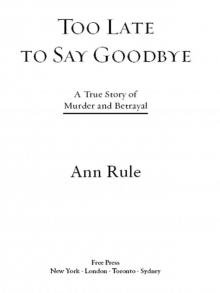 Too Late to Say Goodbye: A True Story of Murder and Betrayal
Too Late to Say Goodbye: A True Story of Murder and Betrayal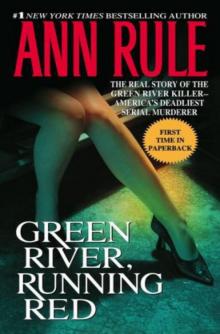 Green River, Running Red
Green River, Running Red Bitter Harvest
Bitter Harvest Dead by Sunset: Perfect Husband, Perfect Killer?
Dead by Sunset: Perfect Husband, Perfect Killer?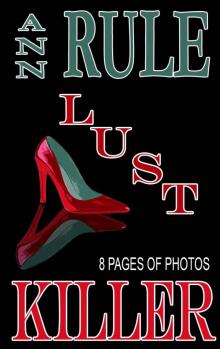 Lust Killer
Lust Killer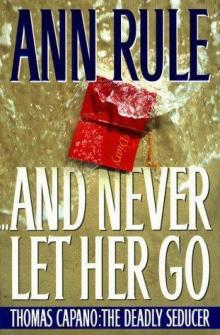 And Never Let Her Go: Thomas Capano: The Deadly Seducer
And Never Let Her Go: Thomas Capano: The Deadly Seducer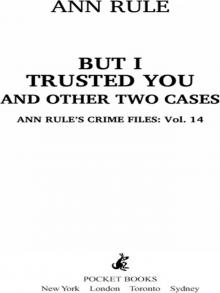 But I Trusted You and Other True Cases
But I Trusted You and Other True Cases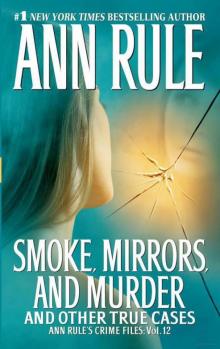 Smoke, Mirrors, and Murder and Other True Cases
Smoke, Mirrors, and Murder and Other True Cases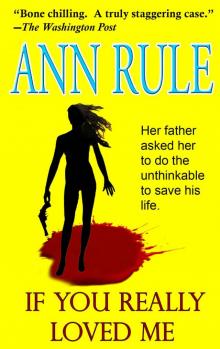 If You Really Loved Me
If You Really Loved Me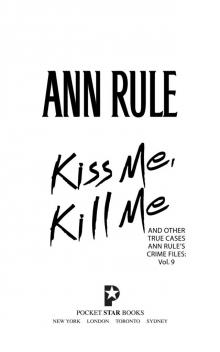 Kiss Me, Kill Me and Other True Cases
Kiss Me, Kill Me and Other True Cases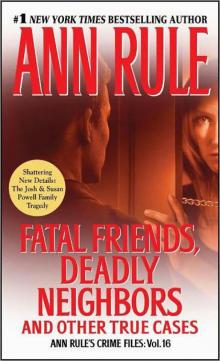 Fatal Friends, Deadly Neighbors and Other True Cases
Fatal Friends, Deadly Neighbors and Other True Cases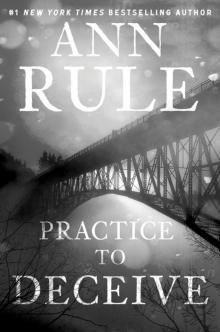 Practice to Deceive
Practice to Deceive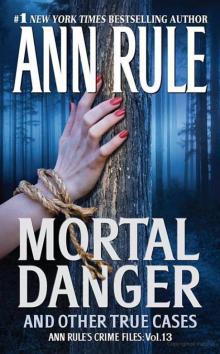 Mortal Danger and Other True Cases
Mortal Danger and Other True Cases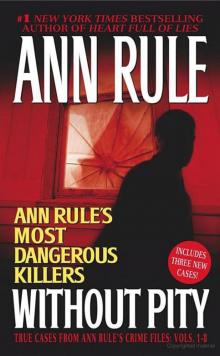 Without Pity: Ann Rule's Most Dangerous Killers
Without Pity: Ann Rule's Most Dangerous Killers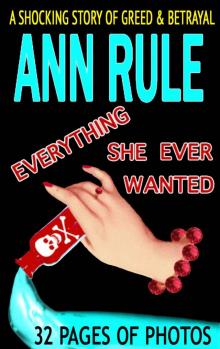 Everything She Ever Wanted
Everything She Ever Wanted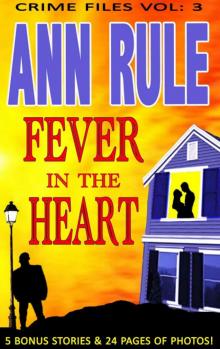 A Fever in the Heart and Other True Cases
A Fever in the Heart and Other True Cases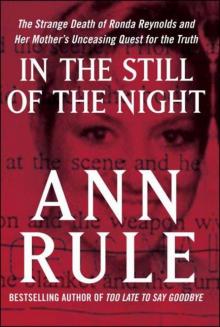 In the Still of the Night
In the Still of the Night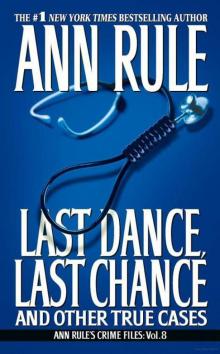 LAST DANCE, LAST CHANCE - and Other True Cases
LAST DANCE, LAST CHANCE - and Other True Cases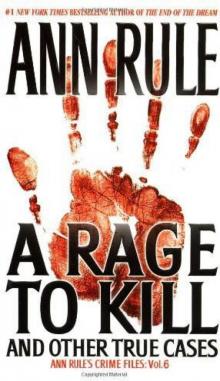 A Rage to Kill
A Rage to Kill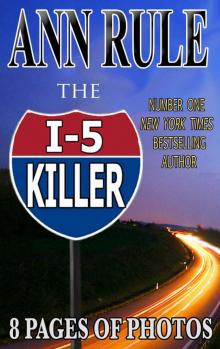 The I-5 Killer
The I-5 Killer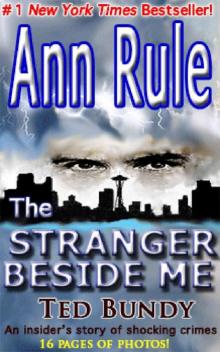 The Stranger Beside Me
The Stranger Beside Me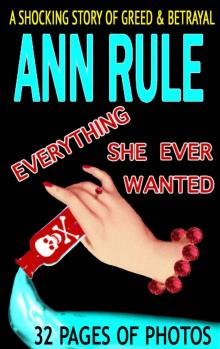 Everything She Ever Wanted: A True Story of Obsessive Love, Murder, and Betrayal
Everything She Ever Wanted: A True Story of Obsessive Love, Murder, and Betrayal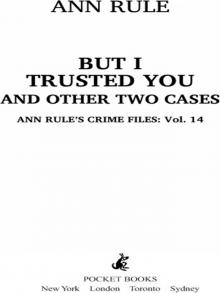 But I Trusted You
But I Trusted You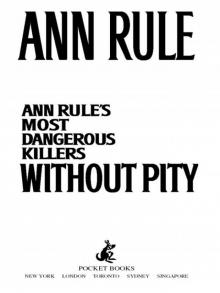 Without Pity
Without Pity Kiss Me, Kill Me
Kiss Me, Kill Me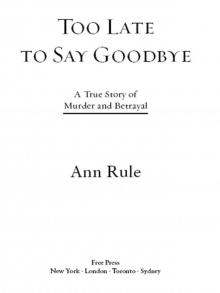 Too Late to Say Goodbye
Too Late to Say Goodbye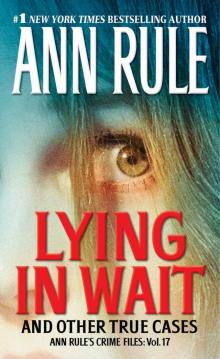 Lying in Wait
Lying in Wait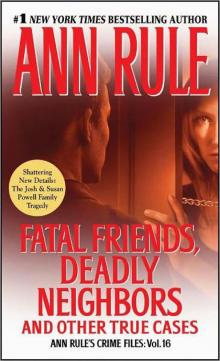 Fatal Friends, Deadly Neighbors
Fatal Friends, Deadly Neighbors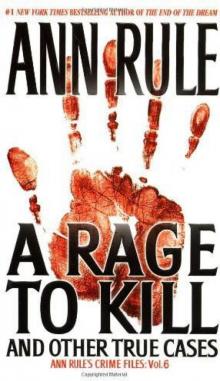 A Rage to Kill: And Other True Cases
A Rage to Kill: And Other True Cases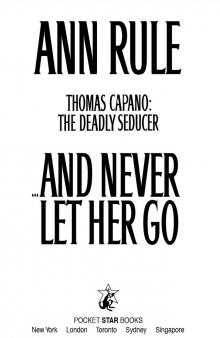 And Never Let Her Go
And Never Let Her Go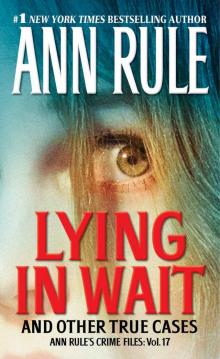 Lying in Wait Ann Rule's Crime Files Vol.17
Lying in Wait Ann Rule's Crime Files Vol.17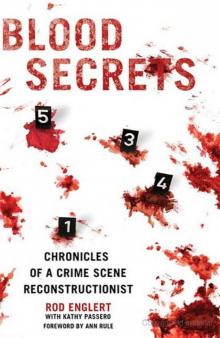 Blood Secrets: Chronicles of a Crime Scene Reconstructionist
Blood Secrets: Chronicles of a Crime Scene Reconstructionist No Regrets
No Regrets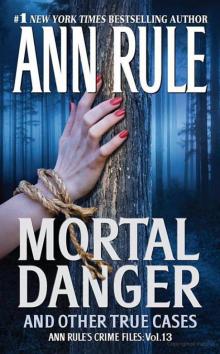 Mortal Danger
Mortal Danger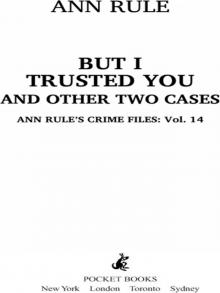 But I Trusted You: Ann Rule's Crime Files #14
But I Trusted You: Ann Rule's Crime Files #14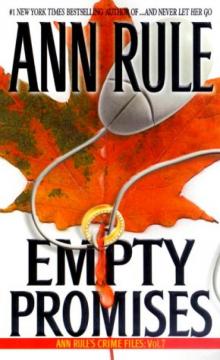 Empty Promises
Empty Promises Dead by Sunset
Dead by Sunset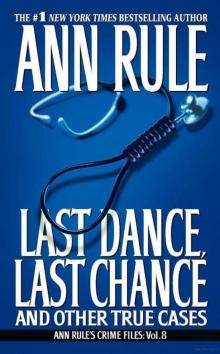 Last Dance, Last Chance
Last Dance, Last Chance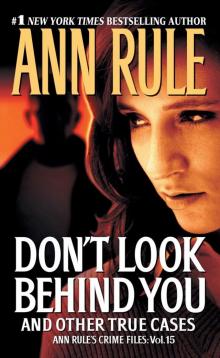 Don't Look Behind You
Don't Look Behind You